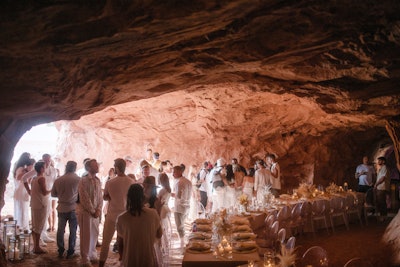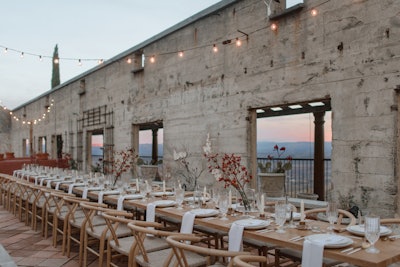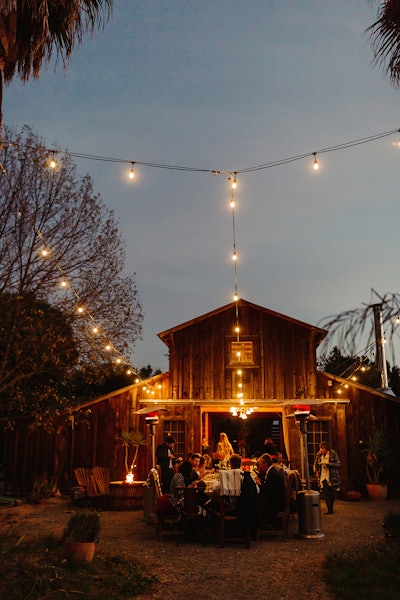
It’s been over a year since Airbnb codified its party ban, after testing a temporary ban on listings globally back in August 2020 that the company claimed “proved effective.” Airbnb cited parties and events at its short-term rentals as “overwhelming” to hosts.
Then, in September 2023, Airbnb issued a clampdown on its New York City listings in conjunction with a new rule called Local Law 18—also known as the Short-Term Rental Registration Law—that limits rentals to two guests and reservations to more than 30 days unless the property is registered with the city. It also requires owners to be present during the entirety of a guest’s stay, and that the guest must have unrestricted access to common areas. Oh, and if homeowners don’t comply, they’ll be slapped with a $5,000 penalty per violation.  Before codifying a party ban, Airbnb cited events at its short-term rentals as “overwhelming” to hosts.Photo: Courtesy of ManhattanBNB
Before codifying a party ban, Airbnb cited events at its short-term rentals as “overwhelming” to hosts.Photo: Courtesy of ManhattanBNB
Aside from deterring vacationers (Airbnb has seen listings in the Big Apple plunge 77% in the three months after the rule took effect, according to AirDNA, which tracks Airbnb data), the San Francisco-based homestay experience company is no longer an event-friendly option. Event planners who traditionally looked to Airbnb for a New York City affair are now having to seek out other options, which can be increasingly difficult without some sort of technology or aggregation platform to assist.
However, Airbnb wasn’t the only short-term rental solution in the concrete jungle—which may be full of event venues, but doesn’t always capture the intimate vibe of a home, or the views of a luxury penthouse apartment.
With short-term rentals top of mind, BizBash took the opportunity to catch up with the teams at ManhattanBNB (a vacation rental solution that gives hosts the autonomy to set their own policies while complying with NYC laws); event agency Cloth & Flame, the parent company of Open Venues (a platform that lets users book rare and historic properties and landscapes for events); and hourly venue rental platform Peerspace to talk about where to look when wanting a short-term vacation rental as an event venue.
These experts also offered up best practices for hosting a gathering in these properties sure to come in handy no matter where in the world you are…
1. Make sure the rental agreement permits events.
First things first: To host an event, a vacation rental’s listing needs to allow events in the first place. Even for properties that allow gathering, “some agreements may limit guest numbers or specify quiet hours,” said Alexandre Ramani, managing partner of ManhattanBNB. “As with all vacation rentals, any nonstandard-use case should be discussed with the host to ensure compliance with house rules, and any restrictions, prohibitions, or fees that may apply.” Alexandre Ramani, managing partner of ManhattanBNB—a vacation rental solution that gives hosts the autonomy to set their own policies while complying with NYC laws—urged event planners to read each property's listing thoroughly.Photo: Courtesy of ManhattanBNB
Alexandre Ramani, managing partner of ManhattanBNB—a vacation rental solution that gives hosts the autonomy to set their own policies while complying with NYC laws—urged event planners to read each property's listing thoroughly.Photo: Courtesy of ManhattanBNB
Planners, once you’re confident a property is event-friendly, “treat the space like you're borrowing it from a family friend” and “leave the property better than you received it,” said Matt Cooley, co-founder of Cloth & Flame and Open Venues. How? With savvy tricks like “laying temporary flooring wherever your caterer is going to be to avoid stains,” Cooley suggested.
2. Think beyond listing rules, and consider local limitations.
Cooley reminded event planners to understand that “beyond the property and platform rules, there are local regulations that might come into play.” “This includes occupancy limits and local alcohol rules,” he noted, as well as “understanding ingress and egress regulations [such as] ensuring safe entry and exit paths for guests, which is crucial. You don't want to put your guests at risk in the case of a fire or natural disaster.”
At the end of the day, while it may seem like a lot of restrictions, there’s a reason! So, “be respectful and don’t put your host at risk,” Cooley warned.
“The rest is all upside!” he added, noting that the uniqueness of choosing a property not considered a traditional event venue “changes everything. The value of a truly original venue goes beyond its physical beauty or historical significance; it becomes an integral participant in the event, shaping and enhancing the experience in ways ordinary venues can't. There are also measurable benefits: no F&B minimums, more flexible production timelines, and they are often available for last-minute bookings where more standard offerings typically book up earlier."  A savvy trick for preserving a property during events is “laying temporary flooring wherever your caterer is going to be to avoid stains,” said Matt Cooley, co-founder of Cloth & Flame and Open Venues.Photo: Courtesy of Open Venues
A savvy trick for preserving a property during events is “laying temporary flooring wherever your caterer is going to be to avoid stains,” said Matt Cooley, co-founder of Cloth & Flame and Open Venues.Photo: Courtesy of Open Venues
3. Ensure the property host or manager is aware of your intentions.
Ramani said the most important thing event planners can do is to build trust with their property host or manager by “keeping an open line of communication and clearly specifying the nature of the event being planned.”
After giving “a thorough read of the listing and the rules for the space,” Rony Chammas, founder and chief strategy officer of Peerspace, said connecting with the host is a best practice when looking to make a short-term rental an event venue.
By sharing event plans with a host, they may be able to share “add-ons,” as many property owners—at least on Peerspace—”are not locked into a set of amenities,” Chammas explained. For example, they could tell planners if there’s storage with additional tables and chairs, or accommodations for speakers or AV equipment” that would otherwise “come at a steep cost at traditional venues.”
4. Leave no room for ambiguity.
“Event planners should also be sure to clarify the house rules,” Ramani said. “For example, if a unit specifies that up to two guests are permitted to stay at a unit, it’s ambiguous whether others are welcome if they don’t stay over.” The solution? Just ask the event host! And be crystal clear, Ramani encouraged.
Chammas made a similar suggestion: “Send any potential hosts a clear description of what you’re planning. This sets expectations on both sides.”
With that, it’s also vital to make more minute details clear, such as whether a short-term rental property can accommodate “certain amenities such as professional sound systems,” what the space limitations are, plus if it’s located in a neighborhood with its own set of restrictions, Ramani pointed out.
However, having to take extra steps to shed light on challenges event profs need to work around to host an affair in a property like the ones listed on ManhattanBNB can be worth it! “These units can offer a unique and personalized environment that offers flexibility, privacy, and home-like amenities. Event planners may also have greater control over event dynamics,” Ramani said. After giving “a thorough read of the listing and the rules for the space,” Rony Chammas, founder and chief strategy officer of Peerspace, said that connecting with the host is a best practice when looking to make a short-term rental an event venue.Photo: Courtesy of Peerspace
After giving “a thorough read of the listing and the rules for the space,” Rony Chammas, founder and chief strategy officer of Peerspace, said that connecting with the host is a best practice when looking to make a short-term rental an event venue.Photo: Courtesy of Peerspace
5. Treat the property host like a client—and a valuable resource.
Cooley weighed in on best practices when hosting an event in a short-term rental: “Treat the property owner like any other valued client, and go into the conversation to demonstrate the activity's benefit versus a typical stay.”
Consider answering these questions when conversing with a host, Cooley said: “What is the ROI for them? Offering them more money than what they would have earned from simple stays in the same time frame is key.”
And because you’re dealing with experts on a specific property—not events—”assume the property owner doesn't typically hold events, and that the process of familiarization will take a little time,” Cooley suggested. “Plan for longer site visits, and be prepared with specifics regarding guest count, noise considerations, and parking logistics.”
All the while, Chammas reiterated the importance of setting clear expectations—“a great place to start because hosts know their space and neighborhood best,” he said. And while you’re at it, take the opportunity to use these people as “a great resource during your planning process.”
“They can share recommended layouts for the space, advise on items like parking or AV needs, and often have recommendations for local vendors like caterers or DJs,” added the founder of Peerspace, whose listings include venues like storefronts, bars, coffee shops, studios, warehouses, and art galleries, just to name a few. The spaces are bookable by the hour for meetings, celebrations, photo shoots, and the like.
6. Write a review!
At Peerspace, “we always recommend guests write a review after their event and share their experience,” Chammas said. “Reviews and photos help other event planners and guests imagine their own event in the space, and hosts love seeing how an event came to life in their space.”



















